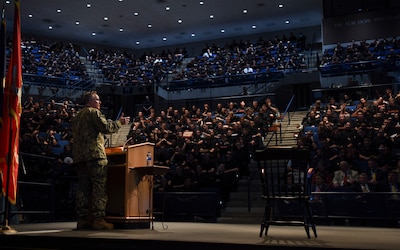
WASHINGTON —
Education will be a key part of maintaining America’s might upon the sea, Navy officials said today as they unveiled their comprehensive look at education in the service.
Navy Secretary Richard V. Spencer signed a memorandum that will lead to the establishment of a Naval University System that will help develop America’s ultimate competitive advantage: the minds of its service members.
The memo is an outgrowth of the Education for Seapower Study — the first comprehensive “top to bottom” look at Navy education in 100 years.
The effort looks to maintain America’s lead in military affairs.
Protecting Competitive Advantage
The impact of education can be huge. Education will lead to America’s competitive advantage, Navy officials said. Technology — as good as it is — can only go so far if the people operating it do not understand the implications.
“The last remaining advantage that we have will be our minds,” Navy Undersecretary Thomas Modly said during an interview. “We have to make sure we are getting the best people and that we are training them and educating them to be agile and adaptable so they can deal with uncertainty in a better way.”
The effort will go from the deckplates to the flag and general officer ranks, with the service establishing a Naval Community College system and putting in requirements for masters degrees in strategic studies for all unrestricted line flag and general officers.
The memo calls for the service to have a chief learning officer — a senior executive service civilian — in place by June. That person will develop the education strategy by December. Adm. John Richardson, the chief of naval operations, is reorganizing the Naval Staff to create the position of director of warfighting development.
Building an Educational System
The creation of the Naval Community College is first on the agenda and there could be people in the program by 2020, officials said.
Spencer called for the review when he first came into office last year. He was concerned that the Navy, because of the operational requirements, was not getting the right people, the right education for their position.
Panel members looked at the Marine Corps University and the Army and Air Force equivalents in forming the recommendations.
Part of this effort is to consider the way delivery methods for education have changed over time. The service has to get the mix of distance education and in-residence time right. The Navy has people all over the world and it will be a huge advantage for them to be a part of this, officials said.
The Navy and Marine Corps have world-class faculty in their institutions and the rest of the fleet needs to be exposed to them, Navy officials said. Distance learning gives sailors and Marines the opportunity to learn from them.
Tailored Education
The Navy wants the system to be tailored to the way the force fights, officials said. The U.S. military is a joint force and the Navy and Marine Corps cannot be separate from the Army and Air Force, officials said.
The panel consulted with Army and Air Force in setting up the system, because “frankly the Army and the Air Force have been doing a much better job of putting a high value on education,” officials said. “We took a lot of lessons from the way they are structured and addressing it to inform this study.”
A large part of the effort is establishing a Navy community college system. The idea is to get sailors and Marines have educational programs delivered to them wherever they are. This will develop into a system that will be a mix of online learning and at schools to fulfill the needs of the individuals and the services.



